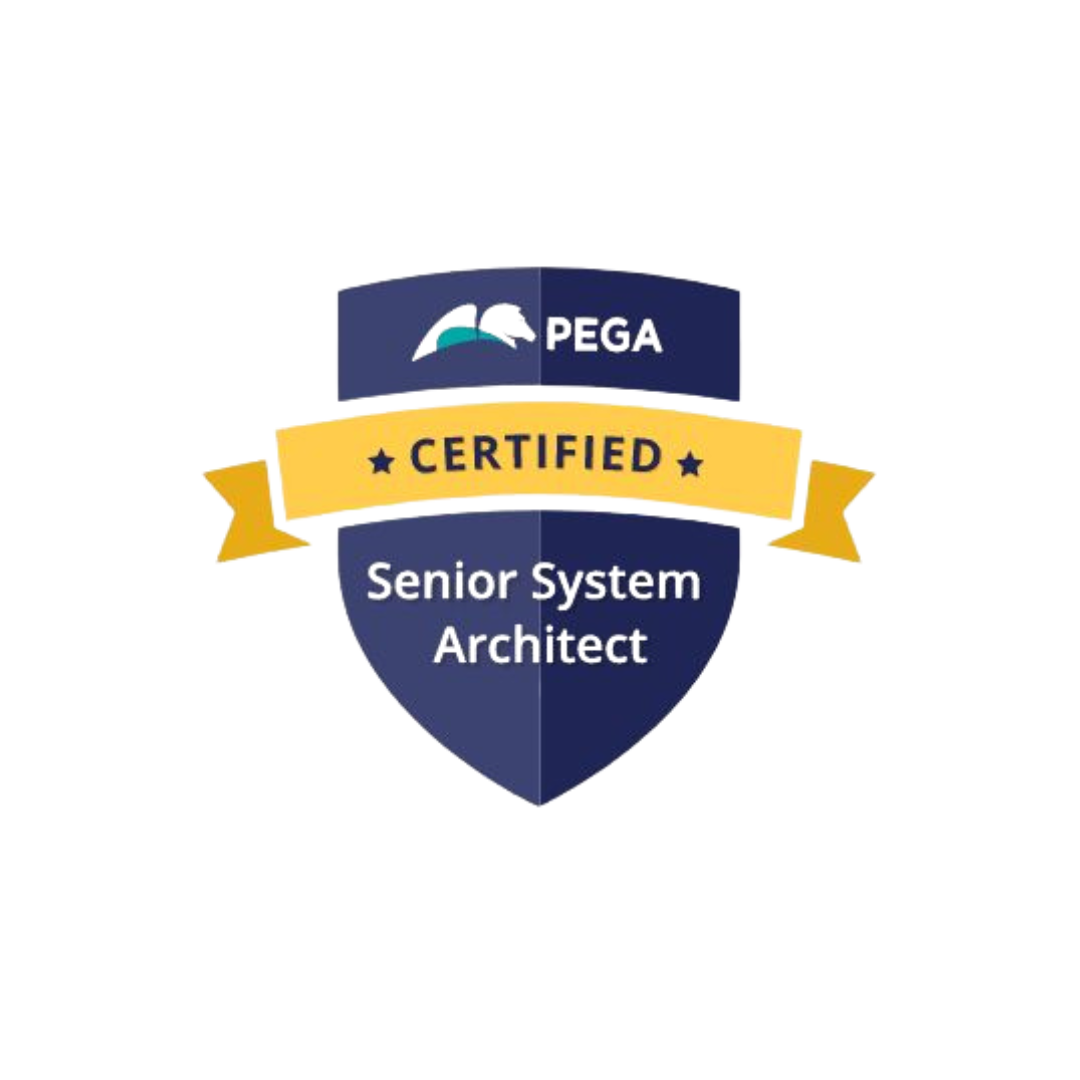Pega CSSA Training In Hyderabad
Learn From Industry Expert With 100% Placement Assistance
(4.8 Rating from Over 2564 Learners)
- Live Training
- Real Time Projects
- Weekly Doubts Session

Pega CSSA Training in Hyderabad Details
About the Training -
We are at the forefront of offering Pega CSSA (Certified Senior System Architect) Training in Hyderabad, designed for advanced learners in Pega technology. Aimed at those with foundational Pega knowledge, our online program dives into complex architectural and integration concepts. Taught by industry experts, our curriculum combines theoretical knowledge with practical, real-world projects. This training is perfect for professionals looking to upscale their skills and advance in the competitive field of process automation.
Key Points of Pega Training
Beginners to Intermediate
CSA & CSSA Concepts
Interview & Job Support
Real Time & Industry Experts
Updated Material
Online Batch & One on One
Pega Training Program Highlights -
- Multiple Real-Time Projects
- Gain 1-2 Years Experience in Just 45 Days
- 100% JOB Oriented Program
- One-on-One Mentor with Project Support
- Mock Interviews | Interview Guidance
- Resume Preparation & Access to Recordings for 365 Days
- Whatsapp Group & Doubts Sessions
- Special Material only for Interview Preparation
- 1-1 Training Available
What is Pega CSSA?
Pega is a premier software platform specializing in Business Process Management (BPM) and Customer Relationship Management (CRM), aimed at facilitating business automation, operational efficiency, and improved customer interactions. Created by Pegasystems, it equips companies with the tools to craft, implement, and oversee dynamic business applications, significantly reducing the need for extensive coding. This aspect is particularly crucial for those pursuing the Pega CSSA (Certified Senior System Architect) certification, as it focuses on leveraging Pega's capabilities for developing sophisticated applications efficiently.
Why you Should take Pega CSSA Training?
Pega stands as a robust Business Process Management (BPM) platform that’s indispensable for organizations and professionals aiming for the top in process automation:
Efficient Automation: With its model-driven approach, Pega CSSA enables experts to streamline complex workflows, enhancing efficiency and cutting costs.
Advanced Development Skills: The training emphasizes Pega’s no-code/low-code capabilities, equipping professionals with the skills to craft advanced applications quickly and promote innovation, even without deep coding knowledge.
Superior Scalability: Pega CSSA’s training highlights the platform’s exceptional scalability, preparing learners to develop solutions that grow seamlessly with the business.
Customer Engagement Mastery: The curriculum covers Pega’s AI-driven tools prioritizing customer engagement, allowing professionals to tailor experiences that effectively resonate with clients.
Integration Expertise: Pega CSSA training helps learners master the art of integrating Pega into diverse IT landscapes, ensuring streamlined business operations.
High Market Value: As Pega’s implementation spreads across critical sectors, there’s a surging market demand for CSSA-qualified professionals, opening doors to substantial career advancement and opportunities in a global landscape.
Pega CSSA Training In Hyderabad Curriculum
Before you begin
Senior System Architect overview
- Creating a Pega application
- Introduction to creating a Pega 7 application 5 Enterprise Class Structure
- How to use the New Application wizard to create an application
- How to configure advanced settings in the New Application wizard
- Introduction to creating a new application version
- Application versioning
- How to create a new application version
- Configuring application rulesets
- Introduction to configuring application rulesets
- Ruleset validation
- The ruleset stacks
- How to manage changes to rules in a ruleset
- Branching rulesets for parallel development
- Introduction to branching rulesets for parallel development
- Parallel development
- How to develop in parallel by branching rulesets
- How to merge changes from a branched ruleset
- Introduction to rule resolution
- Rule resolution
- How the rule resolution process works
- How the rules cache is populated
- How to influence rule resolution through rule availability
Who can Learn Pega CSSA?
Pega CSSA (Certified Senior System Architect) training is designed for a wide array of individuals who want to excel in sophisticated system architecting using Pega’s low-code/no-code environment. Here are the profiles that can gain significantly from this training:
IT Professionals and Developers: For those in the tech sector, learning Pega CSSA skills can dramatically enhance your abilities in business process management and application development, empowering you to build complex systems more efficiently.
Business Analysts: Pega CSSA courses equip business analysts with advanced tools for effectively modeling processes and workflows, enabling them to participate actively in system design without requiring extensive technical skills.
Project Managers: Gaining insights into Pega CSSA can help project managers in enhancing their project delivery through streamlined operations and improved collaboration within teams.
Students and Graduates: Aspiring tech professionals and recent graduates can benefit from Pega CSSA certification, as it helps in building a strong foundation in one of the most sought-after technologies in the industry today, thus boosting employability.
Non-Technical Professionals: The CSSA training also caters to individuals without a technical background, providing them with the know-how to develop and manage complex applications in Pega’s intuitive platform.
Business Leaders and Entrepreneurs: Entrepreneurs and business executives who wish to directly influence their operational strategies can utilize Pega CSSA training to drive business automation and customer interaction initiatives without heavy reliance on technical staff.
Certifications in Pega training in hyderabad -

CSA (Certified System Architect)
This is the entry-level certification in Pega, designed for developers who want to gain foundational knowledge of Pega's platform. It focuses on core concepts like application development, case management, and Pega’s user interface.

CSSA (Certified Senior System Architect)
This advanced certification is aimed at experienced Pega developers who have already earned the CSA. It delves deeper into Pega’s architecture, performance optimization, and complex system designs, preparing professionals for senior development roles.
Career Opportunities after Pega Training in Hyderabad -
As businesses increasingly adopt automation and process management technologies, the demand for professionals skilled in Pega is on the rise. Here are some of the top career paths for those proficient in Pega:
Pega Developer: Pega Developers are responsible for designing and building Pega-based applications. They work with the Pega platform to automate workflows, create efficient business processes, and integrate systems.
- Skills required: Pega development experience, understanding of BPM, good problem-solving abilities.
Pega Business Analyst: Business Analysts work closely with stakeholders to understand business needs and map them onto Pega solutions. They design process flows and help bridge the gap between business requirements and technical implementation.
- Skills required: Strong communication, process mapping, familiarity with Pega tools.
Pega Systems Architect: Pega System Architects focus on creating the architecture and framework for Pega-based applications. They ensure the scalability, performance, and reliability of the applications being built.
- Skills required: In-depth knowledge of Pega architecture, certifications like CSSA (Certified Senior System Architect), PRPC development.
Pega Certified Lead System Architect (CLSA): This is a senior-level role for experts in Pega, leading teams and designing advanced solutions. CLSAs often mentor developers and guide the overall technical direction of Pega projects.
- Skills required: Pega architecture expertise, leadership, advanced certifications.
Pega Consultant: Pega Consultants advise companies on how to implement Pega technology effectively. They provide strategic guidance and help organizations leverage Pega for optimal business outcomes.
- Skills required: Consulting experience, strong Pega knowledge, client management.
Pega Support Engineer: Support engineers provide technical assistance to businesses using Pega systems. They troubleshoot issues, manage system performance, and ensure smooth functioning of Pega applications.
- Skills required: Problem-solving skills, Pega troubleshooting, customer service.
Pega Trainer: With the growing demand for Pega professionals, trainers play a crucial role in educating students, graduates, and professionals on the Pega platform. Pega Trainers conduct courses, workshops, and certification training.
- Skills required: Expertise in Pega, communication and teaching skills.
Pega Solutions Architect: Solutions Architects design tailored Pega solutions for organizations based on their specific business challenges. They work with both business and technical teams to implement effective solutions.
- Skills required: Experience with Pega, problem-solving, client interaction.
Scope of Pega CSSA training in hyderabad
Here’s an overview of the Scope of Pega:
Growing Demand in Industries: Pega is widely adopted across various sectors, including banking, healthcare, insurance, telecommunications, and government. Organizations are increasingly looking for automation solutions to streamline processes, which boosts the demand for Pega professionals.
Digital Transformation: As businesses undergo digital transformation, Pega plays a critical role in modernizing legacy systems, enhancing customer experiences, and improving operational efficiency. Its low-code capabilities make it easier for organizations to adapt to changing market conditions.
Diverse Career Opportunities: With the rise of Pega technology, there is a growing need for skilled professionals in roles such as Pega Developer, Business Analyst, System Architect, Consultant, and more. This creates ample job opportunities and career advancement potential.
Integration with Emerging Technologies: Pega integrates well with AI, machine learning, and analytics, enabling organizations to leverage data-driven insights. This enhances decision-making processes and optimizes customer interactions.
Global Reach: Pega is utilized by organizations worldwide, making Pega skills valuable in the global job market. Professionals with Pega expertise can explore opportunities in various regions, contributing to their career growth.
Continuous Learning and Certification: The Pega ecosystem is constantly evolving, providing opportunities for professionals to further their skills through certifications like CSA, CSSA, and CLSA. Continuous learning ensures that Pega professionals remain competitive and up-to-date with industry trends.
Reviews of Pega Training In Hyderabad -
Student
I had no prior knowledge of Pega, but this training made the concepts easy to understand. The practical examples and case studies were really helpful. Now, I feel confident about starting my career as a Pega Developer.
Student
Pranathi’s guidance throughout the training was invaluable. She explained complex concepts with ease and always made sure we were keeping up. Her real-world insights really helped me bridge the gap between theory and practice.
Student
The online training exceeded my expectations. The sessions were interactive, and I loved how the instructors encouraged questions. I completed my CSA certification and landed a job within a few months of completing the course
Student
Pranathi was an exceptional trainer. Her depth of knowledge in Pega was evident in every session, and she was always available to clear our doubts. Thanks to her, I’ve gained skills that are highly valued in the job market.
Student
This Pega training is the best investment I’ve made for my career. The course content was up-to-date, and the exercises were highly practical. It helped me transition smoothly into the role of a Pega Systems Architect.
Student
Pricings of Pega CSSA Training In Hyderabad
Pega Online Training
-
Recorded Video Access for 1 Year
-
45 Days of Training
-
Includes Live Project
-
Certification-Oriented
-
Basic to Advance Level
-
Interview Guidance
-
100% Placement & Certification Assistance
-
Whatsapp Group, Interview Guide Access
Pega Online Training
-
Special Guidance
-
3 Months Duration
-
Includes 3 Live Projects
-
Certification-Oriented
-
Basic to Advance Level
-
Interview Guidance
-
100% Placement & Certification Assistance
-
Whatsapp Group, Interview Guide Access
FAQs of Pega CSSA Training In Hyderabad -
Pega training equips individuals with the knowledge and skills to develop, manage, and optimize business process management (BPM) applications using Pega’s low-code platform. It covers topics like case management, workflow automation, and application development.
Pega training is suitable for IT professionals, developers, business analysts, project managers, and even non-technical individuals who want to enter the world of automation and BPM. No prior coding experience is required, but familiarity with IT concepts can be helpful.
Pega offers certifications at various levels, including:
- Certified System Architect (CSA) for foundational skills,
- Certified Senior System Architect (CSSA) for advanced expertise,
- Certified Lead System Architect (CLSA) for senior-level professionals and architects.
The duration of Pega training varies depending on the level of expertise being pursued, but typically it can take anywhere from 3 to 10 weeks to complete, depending on the course and certification track.
After completing Pega training, you can pursue roles such as Pega Developer, Business Analyst, System Architect, Solutions Architect, Pega Consultant, and Support Engineer. Pega skills are in high demand across various industries.
No, one of Pega’s strengths is its low-code/no-code approach. Even individuals with minimal coding experience can quickly learn to build applications using Pega’s visual tools and model-driven architecture.
Pega training provides you with in-demand skills in automation and BPM, opening doors to high-paying roles across industries. With Pega certifications, you can stand out as a specialist in process optimization and digital transformation.
Beginner (0-2 years): A beginner with a Certified System Architect (CSA) certification can expect a salary range of ₹4-6 lakhs per annum in India, or around $60,000-$80,000 per annum in the U.S. This can vary based on the employer and location.
Intermediate (3-5 years): Professionals with 3-5 years of experience or a Certified Senior System Architect (CSSA) certification can earn between ₹7-12 lakhs per annum in India, or $85,000-$110,000 per annum in the U.S.
Experienced (5+ years): Senior-level professionals, especially with a Certified Lead System Architect (CLSA) certification, can earn ₹15-25 lakhs per annum in India, or $120,000-$160,000 per annum in the U.S., with salaries scaling higher for leadership roles.
Our Other Courses

Digital Marketing

Celonis


The Pega training was absolutely fantastic! The curriculum was well-structured, and the hands-on projects gave me a clear understanding of real-world applications. I feel fully equipped to tackle Pega-based projects at work now.